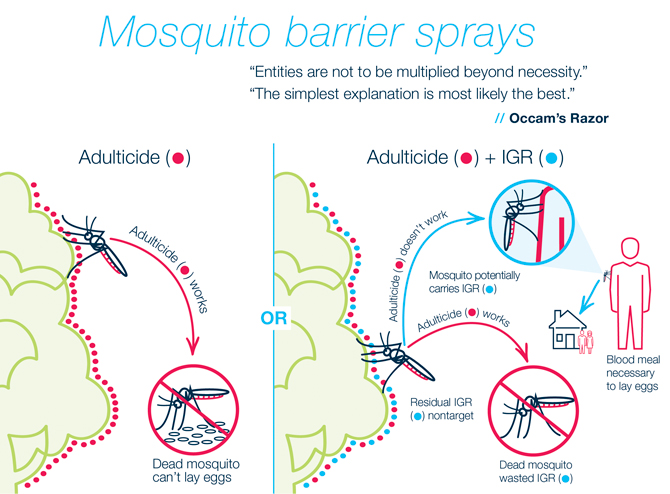Backyard barrier treatments: if your mosquito adulticide is doing its job, you don’t need to add an IGR to your tank
Insect Growth Regulators (IGR) are meant to be applied to labeled aquatic locations where the larval stage of mosquitoes are found. There are mosquito control products that come formulated with residual pyrethroids in combination with an IGR. But if your adulticide is doing its job, is an IGR necessary? Eliminating blood-feeding adult mosquitoes will end transmission of the diseases they vector.
Q: When applying a barrier treatment for mosquito control, is it a good idea to add a larvicide to the adulticide or use a combination product?
A: First, when applied according to label, a pyrethroid labeled for mosquito control should kill the adult mosquito when it comes into contact with the treated surface. With this simple fact established, any secondary effect from an IGR becomes irrelevant. Second, it is important to remember the standard pyrethroid label language found on all residual mosquito barrier sprays: “do not allow pesticide to enter or run off into storm drains, drainage ditches, gutters or surface waters”. These are locations where an IGR would be effective, but if you have a pyrethroid in your formulation or tank-mix and you treat there, you are violating federal label.
Q: Do adult mosquitoes pick up the larvicide from the sprayed foliage and carry it to the breeding site where it will have its larviciding effect?
A: Perhaps they do, perhaps they do not. What is known, is that if a surface is treated with an effective adulticide, mosquitoes should die before laying their eggs. Even if they do carry an IGR, they would have to mate, take a blood meal, and find a location to lay their eggs before the IGR found its effective site. This takes days. Dead mosquitoes don’t lay eggs.
Consider: If an application contained both a pyrethroid for adult control and a larvicide for larval control, why didn’t the adulticide kill the adult mosquito when it landed on the treated surface or during the days following before it laid its eggs? The only plausible answer is that the adulticide is ineffective. So then why add an IGR? Either the adulticide is ineffective and doesn’t kill the mosquitoes resulting in a need for the IGR, or you’re wasting your money by including the IGR because the adulticide is effective and the mosquito never has the opportunity to mate, take a blood meal, find a breeding site, and lay her eggs.
Q: Can one single mosquito carry enough larvicide to have an impact on a breeding site?
A: It is impossible to know the answer to this question since breeding sites, introduction of water, flushing, location, and presence of UV all impact such considerations. Furthermore, the quantity of larvicide a mosquito can pick up from a treated surface and successfully carry over distance is unknown. Support of IGR autodissemination often utilizes data from laboratory studies in confined spaces with petri dishes. These are not real-world conditions and are not a reflection of how a product will perform. Laboratory studies alone are not conclusive and confusion exists in the scientific community regarding the true impact of autodissemination in a mosquito management program.
Q: From the time a mosquito hatches to maturity when it can reproduce and lay eggs is about a week. What else must happen for a mosquito to lay eggs?
A: Only females lay eggs and a blood meal MUST be taken before the female lays eggs. The justification often given by some manufacturers to include an IGR in a residual barrier treatment is because it results in decreased egg abundance or autodissemination of the IGR to cryptic, inaccessible breeding sites. These justifications lack logic and scholarly research, and require failure of the mosquito treatment. For nearly all mosquitoes, egg laying occurs only after a blood meal is taken. At this point in time, the treatment is ineffective due to biting activity, which will likely result in callbacks, and exposes people and animals to disease transmission.
Remember, the only way to end transmission of diseases vectored by mosquitoes is to eliminate blood-feeding adults.
For effective mosquito control, consider using Suspend® PolyZone® adulticide. It doesn’t require an IGR to effectively kill blood-feeding adult mosquitoes. Suspend PolyZone provides a long-lasting barrier treatment that resists wash-off and provides a sustainable solution at low rates, all while helping reduce mosquito populations in customers’ backyards.
// Increase efficiency and kill more mosquitoes by eliminating a complicated and ineffective tank-mix
// End the breeding cycle – Suspend PolyZone residual lasts up to 90 days
Don’t waste time, money, and your reputation on adulticide/larvicide combinations when they may not be logical or effective for residential backyard services.
For more information, contact your local Envu Pest Management & Public Health Representative.

